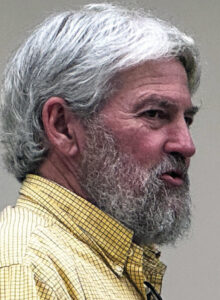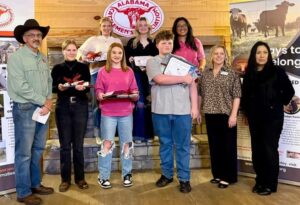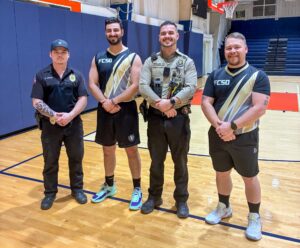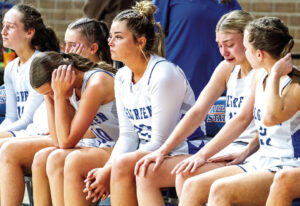Hunters not deterred by CWD
For the fourth straight season, hunters in Franklin, Lauderdale and Colbert counties will be required to submit any deer they harvest for testing for Chronic Wasting Disease (CWD).
CWD is a fatal, contagious neurological disease in white-tailed deer and other deer species, according to the Alabama Department of Conservation and Natural Resources (ADCNR).
The disease is caused by a mutated protein (prion), and common results are an altered behavior. The later stages of the disease show signs of listlessness, lowering of the head, weight loss, repetitive walking in set patters and lack of responsiveness. It is always fatal for white-tailed deer.
The Centers for Disease Control and Prevention states there is no strong evidence for the occurrence of CWD in people, should they eat venison or elk meat that is infected with the disease.
“CWD has been around as long as I have, and it’s not really been a topic [here] except for the last few years,” Goad said. “I respect what [ADCNR] is trying to do, but I don’t think it is as big of a deal as it’s made out to be.”
Hunters who harvested deer inside the highrisk zone and the buffer zone of the state’s CWD Management Zone must submit for testing any deer harvested during three weekends: Deer killed during the opening of the deer season this past weekend.
Other mandatory sampling weekends in the high-risk zone are Dec. 6-7 and Jan. 17-18, 2026.
The sampling weekends for the buffer zone are this weekend and Jan. 17-18, 2026.
The high-risk zone contains the northern part of Franklin County and all of Lauderdale and Colbert counties. It extends north of Alabama Highway 24 from the Alabama/ Mississippi state line east to U.S. Highway 43.
The buffer zone includes the remaining part of Franklin County, south of Alabama Highway 24 and east of U.S. Highway 43.
The mandatory weekends correspond with peaks in Alabama deer harvest, which is the opening of gun season and the rut in the northwest section of the state, according to ADCNR.
All deer harvested by hunters on certain public lands in the management zone are required to be sampled throughout the season. Those lands include Freedom Hills, Lauderdale and Seven-Mile Island wildlife management areas, the Cherokee Physically Disabled Hunting Area, and the Riverton Community Hunting Area.
Moving south
CWD first became apparent in Tennessee and Mississippi in 2018. It eventually moved south and east into Lauderdale County in 2022, when the first case in the state and the county was detected.
Four more positive cases were found before the first positive case in December 2024 was discovered in Colbert County.
Since then, the one CWD case found in Colbert County has been the only case found within the county. Eleven total samples have tested positive in Lauderdale County for CWD.
Sampling will continue at least another five years if not more, according to ACDNR spokesperson Marianne Gauldin.
“If no additional positive cases are detected for a period of one year, then targeted surveillance for CWD will be continued for four additional years in the [management zone] and all counties that intersect or are adjacent to the [buffer zone],” she said.
“If no new cases of CWD have been found for five consecutive years, CWD sampling within the [management zone] will be reduced to standard surveillance levels, and [management zone]specific regulations and non-movement qualified status of captive cervid facilities located within the [management zone] will be lifted.”
Incentives
As a way to increase CWD samples to be submitted for testing on mandatory testing dates, or within the management zone, hunters are eligible to receive a CWD Sampling Permit from ACDNR. The permit allows a hunter to harvest one more antlered deer from within the management zone for each sample submitted. The permits are capped at two per hunter.
There are carcass restrictions in place for deer harvested in the management zone.
Regulations prohibit the transport of harvested deer from the management zone outside of the buffer or high-risk zones. Deer harvested within the high-risk zone must remain and be disposed within the high-risk zone. Deer harvested in the buffer zone must remain and be disposed within the management zone.
Deboned meat, cleaned skull plates and raw hides with no visible brain or spinal cord tissue can be taken outside of the zones.
Still hunting
Hunter Goad and other hunters in Lauderdale, Colbert and Franklin counties said the presence of CWD and the requirement to submit samples on dates set by ADCNR have not precluded them from hunting in their home counties.
“I hunt 90% of the time in Lauderdale County,” Goad said. “So, no, the presence of CWD has not made me look elsewhere to hunt for deer.”
John Harkins, an avid deer hunter, said he spends most of his time hunting in his home county (Colbert) and sometimes in the Demopolis area and Tuscaloosa County.
“I also travel outside of the state to deer hunt, like Missouri and Tennessee. They have CWD, but that’s not deterred me from hunting there or here,” Harkins said.
Harkins said he has no problem with the regulations surrounding CWD in the tri-county area. He said it’s become second nature to submit deer he’s harvested for testing.
“The regulations are in place to ensure safety for the hunters, so I have no problem with them,” he said. “Since I skin and do my own processing, I’ll make the call whether I will eat the meat or not. If it’s nasty, I’m not going to eat it. If the meat looks normal, then I make summer sausage and jerky out of it.”
Most hunters learned to hunt with their dads and have fond memories of doing so at a young age.
Austin Hill said hunting was something he loved to do because it was time he got to spend with his dad.
“I’ve hunted [in Lauderdale County] all my life. I know CWD has been here for several years. There have been several studies and samples taken over those years, but it hasn’t stopped me from hunting here or eating the deer I harvest,” he said.
Hill said of all the samples he’s submitted for testing over the past four seasons he’s never had one come back positive.
So far, there have been 12 confirmed cases of CWD since the first case in the state was discovered in January 2022 in Lauderdale County.
Hill said he usually harvests two deer in Alabama and two in Tennessee.
“I’ll shoot early for the meat, which usually is two deer, and then I’m looking for that trophy deer to put up on my wall,” he said. “My girlfriend has told me my house is already filled with too many deer, so I may have to build a shop to put some of them in.”
Tyler Evans said he primarily hunts in Colbert County, but the presence of CWD has not prevented him from eating the meat from the deer he harvests each season.
“I hunt for the meat,” he said. “I’ll harvest three or four deer, which will be enough for my family to eat on for at least a year. The presence of CWD doesn’t affect me. I take the deer to the processor to submit for sampling and take the rest of the meat home.”







